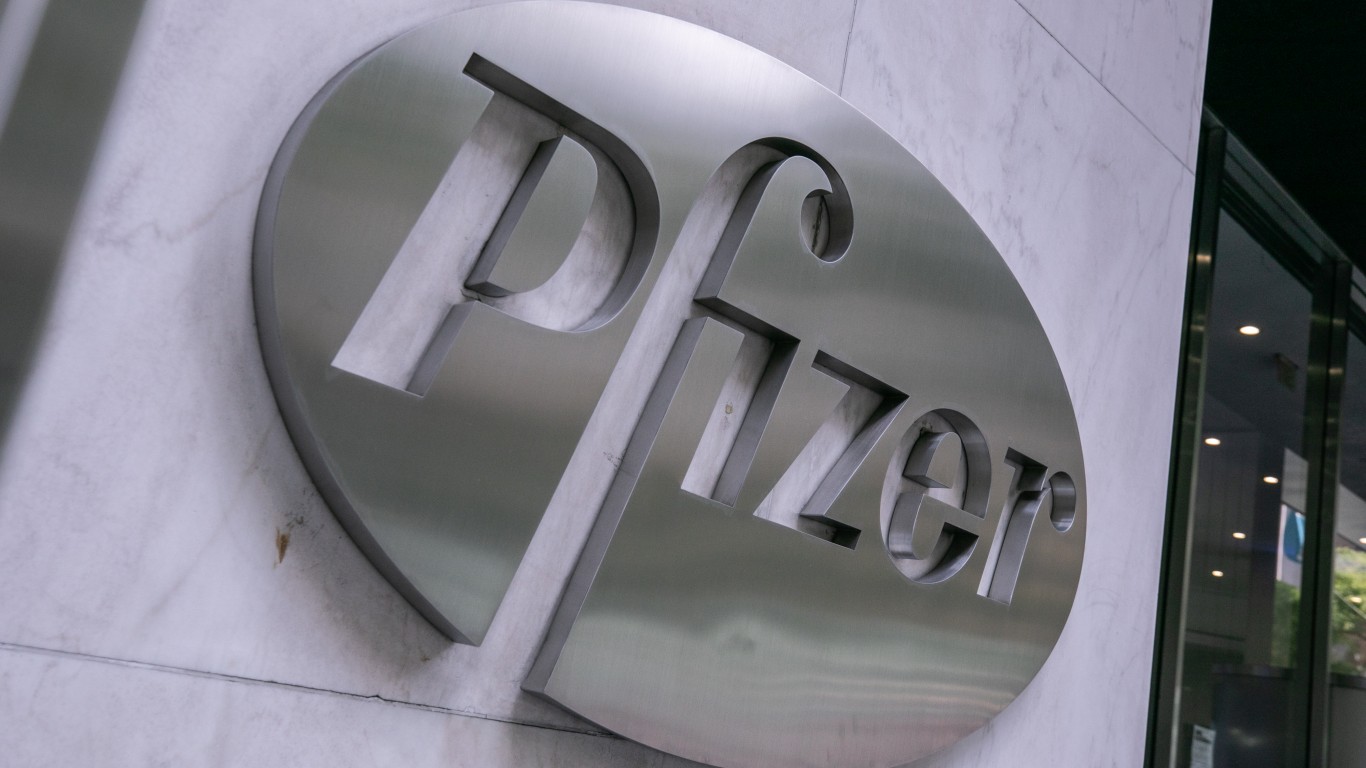
The bull market officially turned nine years old in the week of March 10, and the major stock indexes closed up for the week after weeks of volatile trading. The market overcame trade war risks from steel and aluminum tariffs, and the European Central Bank muted its quantitative easing bias language. And a super strong jobs report managed to come with slightly less wage inflation than had been seen in the prior month. Companies are still showing positive news around earnings and revenues, and tax reform is still acting as a serious floor for many investors who might have otherwise been worried about valuations.
24/7 Wall St. evaluates dozens of analyst calls each day of the week to find new ideas for investors and traders. This ends up being hundreds of analyst calls each week. Most of the traditional new and reiterated Buy and Outperform ratings comes with upside of 8% to 10% in Dow Jones industrial average and S&P 500 stocks, and sometimes that implied upside to the price target can be as much as 15% or 20%. Then there are the analyst picks in more speculative stocks, which often come with market capitalizations that are considered small — and some are even in the micro-cap world under $200 million in value. It is the speculative stocks, which often come with very low share prices as well, where the projected analyst price target comes with upside potential of 50%, 100% or even exponential upside.
Investors need to take a breath and relax before getting overly excited about the dream of doubling their money in a stock. The quest to find the small cap stock that can turn into the next Apple, Google, Amazon, Gilead and so on is a rather risky game. Most companies that have very low market caps and low share prices tend to keep having low values and share prices. And some of these companies can be so risky that they could implode down the road.
Investors need to understand that when analysts target 100% or more upside, they are usually the most aggressive analyst calls on Wall Street. These are typically in emerging biotech and pharma, speculative new technology outfits and other oddball companies with business models that may be rather unique.
One major consideration among speculative analyst stocks is that analysts are often wrong. They can see only upside in some cases, and they can underestimate the powers that may be working against a company. Sometimes things just go wrong from poor management or unlucky events that were not seen or known.
Another serious risk in speculative stocks is that a rising market generally needs to be there to support stocks. If the market is selling off, most investors will feel more comfortable in dividend-paying stocks that have steady earnings and long histories of delivering for shareholders. A stock market sell-off similar to the one seen in late-January through mid-February can be absolutely brutal against speculative stocks.
We have included recent trading data, implied percentage upside to the stated price target and, if applicable, a consensus analyst target price from Thomson Reuters.
Here are eight speculative stocks where one or more analysts have issued roughly 100% or higher implied upside to their price targets during the week of March 10.
Durect Corp. (NASDAQ: DRRX) was raised to Buy from Neutral with a $3.50 price target at H.C. Wainwright on March 6. The company researches and develops medicines based on its epigenetic regulator and drug delivery programs. This call was made after it posted revenues of $19.5 million and earnings per share of $0.05 a few days earlier, and those were ahead of expectations.
This $3.50 target was up more than 100% from the $1.50 prior closing price, but Durect shares were at $1.85 by the end of the week. The stock’s 52-week trading range is $0.74 to $2.17, and the market cap is almost $275 million.
Evolus Inc. (NASDAQ: EOLS), which has a lead candidate as an injectable formulation of a 900 kDa botulinum toxin Type A complex for medical aesthetic treatments and procedures, was given mostly huge upside in the initial analyst views. SunTrust Robinson Humphrey started Evolus with a Buy rating and a $24 price target on March 5, and Cantor Fitzgerald gave a new Overweight rating and $25 target on the same date. That is up over 100% from the $11.44 prior closing price.
Evolus traded at $10.85 shortly thereafter, but a 12% gain on Friday took its shares up to $12.07. The post-IPO range is $9.60 to $12.97.
FuelCell Energy Inc. (NASDAQ: FCEL) was reiterated as Outperform and with a $4 price target at Oppenheimer on March 8, after its quarterly loss was narrower than expected. That was up well over 100% from the prior $1.71 closing price, and the stock closed up at $1.82 a share after the call and in a strong market on Friday.
Oppenheimer feels that FuelCell Energy continues to execute well, while it is limiting its cash burn and delivering product on time. And gross margin is improving while the company is also building a project pipeline in North America and accelerating its equipment sales in Asia. Oppenheimer believes that all that and the recently passed extension of the investment tax credit are helping move FuelCell toward positive operating cash flow. Its contract backlog is nearly $640 million at this point.
FuelCell Energy has a 52-week trading range of $0.80 to $2.49 and a market cap of roughly $140 million. Its consensus target price is roughly $3.50, but that is from a very small group of analysts.
Genocea Biosciences Inc. (NASDAQ: GNCA), which is targeting develops novel cancer vaccines, was given two huge upside calls this week. H.C. Wainwright started it with a Buy rating and a $5 price target (versus a $1.11 close). Earlier in the week, Cantor Fitzgerald assigned an Overweight rating and a similar $5 target (versus a $1.03 close).
The positive themes around each call were on the notion that personalized therapies will be among the next big things, and a recent cash raise in January helped bolster its books.
Genocea Biosciences was trading at $1.17 later in the week and closed up almost 4% at $1.24 on Friday, in a 52-week range of $0.79 to $7.29. It has a mere $102 million market cap.
Intellia Therapeutics Inc. (NASDAQ: NTLA) was started as Market Outperform with a $76 price target at JMP Securities on March 8. This was more than 100% upside from the prior $29.43 closing price, but the shares were up 8% at $31.95 after the analyst call was made.
Intellia’s 52-week range is $11.15 to $33.34, so a lot of the big upside already may have been seen by some of the other analysts who cover this $1.35 billion company.
Plug Power Inc. (NASDAQ: PLUG) was reiterated as Buy with a $5 price target at Canaccord Genuity, which noted that the recently passed extension of the investment tax credit invites improvement, as well as a new North American retailer coming on board. This represented more than 150% upside, despite a small disappointment on earnings.
Plug Power was trading at $1.95 late in the week, in a 52-week range of $0.92 to $3.21.
Revance Therapeutics Inc. (NASDAQ: RVNC) was started with a Buy rating and assigned a $60 target at Goldman Sachs. That compares with a prior close of $31.30 and a $32.75 price late in the week. It is almost unheard of for Goldman Sachs to issue such optimistic upside.
Piper Jaffray issued a more conservative price target of $48, which still implied upside of more than 50% at the time. Revance is targeting the development and commercialization of novel botulinum toxin products for various aesthetic and therapeutic indications.
Revance has a post-IPO trading range of $18.00 to $32.75, so it already has been quite volatile. The company has a $1.2 billion market value.
Turtle Beach Corp. (NASDAQ: HEAR) has been around for a while and makes headsets for video gaming and entertainment systems. It is also tiny, with a $24 million market cap. Turtle Beach was reiterated as Outperform with a $1.50 price target at Wedbush Securities this week. The firm pointed to anticipated revenue growth and further gross margin expansion as allowing the company to increase profitability while reinvesting in growth opportunities.
This call for Turtle Beach now represents more than 200% upside from the $0.48 closing price on Friday, but its stock was at $0.56 ahead of the analyst call. That may not be the best price action and may be just one more flag for investors looking at a rather speculative company. Turtle Beach has a 52-week range of $0.41 to $1.12.
A group of candlestick charts from StockCharts.com is included below. This shows the 60-day performance of each of the eight speculative stocks named in this report. Charts for the key exchange traded funds have been shown as well: NASDAQ 100 (QQQ), Dow (DIA), S&P 500 (SPY) and the S&P Small Cap 600 ETF (VIOO).
Take Charge of Your Retirement In Just A Few Minutes (Sponsor)
Retirement planning doesn’t have to feel overwhelming. The key is finding expert guidance—and SmartAsset’s simple quiz makes it easier than ever for you to connect with a vetted financial advisor.
Here’s how it works:
- Answer a Few Simple Questions. Tell us a bit about your goals and preferences—it only takes a few minutes!
- Get Matched with Vetted Advisors Our smart tool matches you with up to three pre-screened, vetted advisors who serve your area and are held to a fiduciary standard to act in your best interests. Click here to begin
- Choose Your Fit Review their profiles, schedule an introductory call (or meet in person), and select the advisor who feel is right for you.
Why wait? Start building the retirement you’ve always dreamed of. Click here to get started today!
Thank you for reading! Have some feedback for us?
Contact the 24/7 Wall St. editorial team.

 24/7 Wall St.
24/7 Wall St. 24/7 Wall St.
24/7 Wall St.




